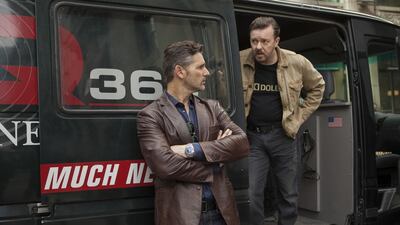“I just don’t try to make my characters funny,” says Ricky Gervais. “It’s much funnier if they’re angry. That’s funnier than clowning – anger. It’s loads funnier.”
When Gervais shares advice about comedy, it's a good idea to listen. He is, after all, the creator of acclaimed British TV comedies The Office, Extras and Derek, among others, and has starred in Hollywood films including The Night at the Museum series, Ghost Town, Muppets Most Wanted and The Invention of Lying, which he also co-wrote and co-directed.
“Someone who’s not trying to be funny, they’re funny already,” says the 54-year-old actor. “If you desperately want to be taken seriously but your wig blows off, that’s funny – whereas if you’re just an idiot, it doesn’t matter.
“I’m an idiot. I’m basically an idiot. It doesn’t matter if I fall over. If you slip over it’s devastating – but I’m already basically an idiot. It’s devastating for you though.”
After making his big-screen directorial debut with The Invention of Lying (2009), in 2010 he co-wrote and co-directed (with long-time collaborator Stephen Merchant) the film Cemetery Junction, a coming-of-age comedy-drama set in 1970s England.
Six years later, he has been back behind the camera working on two new films, both of which he wrote, directed and takes the lead role. Later in the year, we will see the return of The Office's boss from hell David Brent in Life on the Road, as he tries to live his dream of being a rock star.
First up, though, is Special Correspondents, a satirical comedy made for Netflix that had its world premiere at the Tribeca Film Festival in New York last week, and which will be released on the streaming service on Friday.
It tells the story of two journalists – played by Gervais and Eric Bana – who become international celebrities while filing fake stories about a South American revolution while living in a room above a Spanish restaurant in New York.
Gervais says the comic relationship between the pair is key to the film – and something he feels many modern comedies ignore in favour of shock value.
“The central relationship in the film is quite old fashioned,” he says. “It’s a throwback to Laurel and Hardy.
“A lot of comedies now are gross-out lowest-common-denominator stuff. They want everyone to go to the cinema on the first day or it’ll be taken off the screen. It’s homogenised and safe and OK – but everyone knows what they’re getting. It’s focus-grouped to death. It’s the same as that film you saw last month, so you like it.”
Gervais is the latest big-name star to embrace the online revolution with Netflix, after the likes of Kevin Spacey (House of Cards), Adam Sandler (The Ridiculous 6) and Idris Elba (Beasts of No Nation).
“I like the freedom with Netflix,” says Gervais. “It could be the rebirth of the auteur. It cuts out the middle man.
“I’ve made films on small channels, I’ve sought out smaller channels. I’ll always say: ‘Let’s go on BBC2, not BBC1. Go on HBO, not NBC, Channel 4 not ITV.’ These lot [Netflix] coming along is the best of both worlds.
“As an artist, you want as many people to see your work as possible, but on TV you have these people saying: ‘You can’t say that.’ Well why? We’re grown ups, we can say what we want. And Netflix lets you do that.”
These artistic arguments seem reasonable, but given that Netflix is just starting out as a film producer, is he concerned that he is in some ways being funded to be a walking advert for it?
“This was going be a studio film,” he says. “I wrote the script and the reaction was probably the best reaction I’ve ever had. There was a bit of a feeding frenzy and we signed to a studio – who I won’t name, because Netflix then came in and bought them out. They just said: ‘We’ll give you the budget, we’ll give you artistic freedom.’ It was win/win.”
This freedom is clearly a driving force in his professional life.
“The reason I started directing in the first place was to protect my writing,” he says. “Then the reason I started producing was to protect my directing.
“I think these new platforms are bringing us back to auteured art. And what I think is exciting about auteured art, rather than committee art, is that you don’t have to be that different to be original. If you think of something, you’ll probably be a bit different. It’s as simple as that.
“I’m only trying to please me, really. That’s it. I think it’s a disservice to the public to try to second-guess them and please everyone. It really is. If you just please yourself, and you are your own worst critic – which you should be – then I think they’ll be grateful that you did it your way.”
Gervais is such a powerful, dominant personality that his co-star, Bana, is somewhat overshadowed during our brief chat.
I ask him, given that the characters in Special Correspondents go to great lengths to fake their work, whether he has economised with the truth on his CV.
“Well,” he says, “you know when you’re a young actor and they give you that form, it will ask you to tick: can you windsurf or parachute or drive cars really fast? I always ticked every box. They train you to do it when you get on set anyway.”
A handy skill to have in future might be getting a word in when Gervais is talking about his work and views in comedy.
cnewbould@thenational.ae

